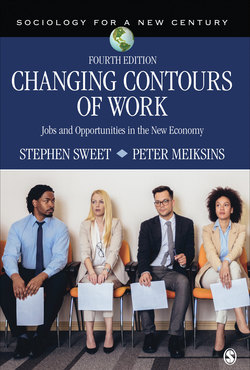Читать книгу Changing Contours of Work - Stephen Sweet - Страница 14
На сайте Литреса книга снята с продажи.
Exhibit 1.4 Rain: A Chinese Immigrant Finds Work in the American Food Service Industry
ОглавлениеRain is twenty-nine years old and has been in the United States for five years. Born and raised in a village in rural China, Rain says that he came to the United States to escape religious persecution (but it is possible that this story is for the sake of his visa application). His journey to the United States was expedited by a “snakehead,” whom Rain paid the equivalent of $70,000 to arrange transport and needed documents. Rain was initially flown from China to Mexico. Like immigrants from South America, he was escorted to the U.S. border and told to “run.” Later he was picked up by an associate of the snakehead, who transported him from Houston to New York.
Within Chinatown in New York, Rain was connected to a network of opportunities to work in Chinese restaurants located throughout the United States. In fact, family run Chinese restaurants outnumber McDonald’s restaurants in small towns. Moving from town to town, Rain learned to cook Chinese food to suit the American tongue, with its heavier emphasis on sweetness. It was in the United States that he tasted his first egg roll. Currently, Rain lives in a house owned by the restaurant owner, along with five of his coworkers, all of whom are Chinese immigrants.
Rain’s treatment in each restaurant depends very much on the ownership, but a constant is an expectation to put in long hours and labor quickly. He commonly works six-day weeks, and his twelve-hour days begin with chopping vegetables and end with cleaning the kitchen. On the whole, he is thankful for the long hours, because that means more money for him and more money to send home. If an owner is too demanding, Rain’s solution is to return to New York, find another restaurant in another small town, and begin again.
He is working hard to pay off his debt and is sending money home, but he has no immediate plans to return to China because his income in the United States is far greater than he could earn in his hometown or in any of the new factories in the urban centers. However, he does feel isolated and lonely. His biggest worry is securing U.S. citizenship.
Note: Based on “The Kitchen Network: America’s Underground Chinese Restaurant Workers” by Lauren Hilgers, 2014, The New Yorker, October 13, 2014.
